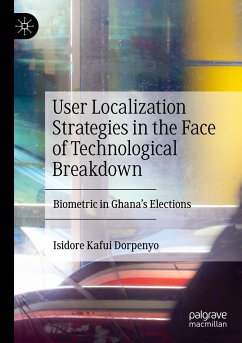This book examines Ghana's use of the fingerprint biometric technology in order to further conversations about localization championed by technical communication scholars. Localization, in this case, refers to the extent to which users demonstrate their knowledge of use by subverting and reconfiguring the purpose of technology to solve local problems. Dorpenyo argues that the success of a technology depends on how it meets the users' needs and the creative efforts users put into use situations. In User Localization Strategies in the Face of Technological Breakdown, Dorpenyo advocates studying how users of technological systems construct knowledge about the technology and develop local strategies to solve technological breakdowns. By analyzing technical documents and interview transcripts, the author identifies and advances three user localization strategies: linguistic localization, subversive localization, and user-heuristic experience localization, and considers howbiometric systems can become a tool of marginalization.
Bitte wählen Sie Ihr Anliegen aus.
Rechnungen
Retourenschein anfordern
Bestellstatus
Storno








